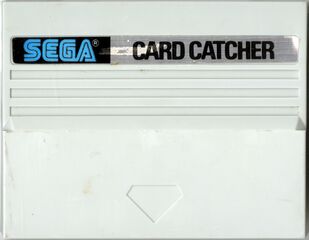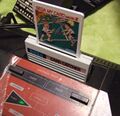Difference between revisions of "Card Catcher"
From Sega Retro
m (→Physical Scans) |
Doc eggfan (talk | contribs) |
||
| Line 51: | Line 51: | ||
| back=Card Catcher SG1000 JP Back.jpg | | back=Card Catcher SG1000 JP Back.jpg | ||
| spine=Card Catcher SG1000 JP Side.jpg | | spine=Card Catcher SG1000 JP Side.jpg | ||
| + | | spine2=Card Catcher SG1000 JP Spine2.jpg | ||
| top=Card Catcher SG1000 JP Top.jpg | | top=Card Catcher SG1000 JP Top.jpg | ||
| − | | | + | | bottom=Card Catcher SG1000 JP Bottom.jpg |
| − | |||
| square=yes | | square=yes | ||
| manual=Card Catcher SG1000 JP Manual.jpg | | manual=Card Catcher SG1000 JP Manual.jpg | ||
Revision as of 09:47, 3 September 2015

| |||||
| Card Catcher | |||||
|---|---|---|---|---|---|
| Made for: SG-1000, SG-1000 II, SC-3000 | |||||
| Manufacturer: Sega | |||||
|
The Card Catcher is a special type of SG-1000 cartridge released in 1985. It acts as a passthrough device for Sega Cards (known as My Cards in Japan), so that they can be run on compatible systems that lack a card slot.
Contents
History
The idea behind the Card Catcher was to distribute SG-1000 games on card rather than on cartridge to reduce production costs. Since the SG-1000 hardware lacked the connector necessary for the card format, a passthrough cartridge was needed for the new format. By the release of the Card Catcher, Sega ceased releasing SG-1000 titles on cartridge almost entirely.
The Sega Mark III improved the internal hardware of the system but remained backwards compatible with SG-1000 and SG-1000 II. One of the major features of the new system was a card slot that could run SG-1000 cards, but the improved hardware meant that it could also run "Mark III Cards" - cards that were not compatible with earlier models but retained the original pinout and shape. When Japan received the redesigned Sega Master System, compatibility was identical to the Mark III.
However, when the Sega Master System hit the western markets, the physical size and pinout of Master System cartridges were redesigned, possibly as a form of regional lockout, thus eliminating cartridge compatibility with the SG-1000. The card slot, however, remained intact, as Sega planned to keep using the same tactic of releasing smaller games on card and bigger games on cartridge.
Towards the latter half of the decade however, new Master System games were considered too large for cards, which usually held about 32K of data. Only Sega supported the card format, and stopped releasing new games on Sega Cards/My Cards after 1987. When the redesigned Master System II was released in 1990, the card slot was omitted completely. The original Power Base Converter was the last piece of Sega hardware to contain a card slot.
Compatibility
The Card Catcher has a Japanese-style shell, which means it will only physically fit within an SG-1000, SG-1000 II, Sega Mark III or Japanese Sega Master System. However, any card from any region can be inserted into the top and played. It is impossible to play a Mark III or SMS card on an SG-1000 system, however it is possible to run SG-1000 cards on a Mark III or Japanese SMS. Like the Power Base Converter, it contains no internal components, simply acting as a passthrough port. SG-1000 cards cannot be played on western systems however, as the BIOS contained in those systems looks for a header file which is not present on SG-1000 cards (as well as all non-western games), effectively preventing the play of these games.
Systems that require the Card Catcher for Sega Cards/My Cards
- SG-1000 (and unlicensed clones)
- SG-1000 II
- SC-3000(H)
- Othello Multivision
- Samsung Gam*Boy II (Korean version of the Master System II)
- Various Asian-style display units
- Sega Master System II
The Card Catcher was only sold in Japan and there is no official western equivalent as the card format was not considered a success.
Gallery
Physical Scans
External Links
- Sega of Japan catalogue pages: SG-1000, SG-1000 II, SC-3000
| Sega SG-1000 Hardware | |
| SG-1000 Variations | SG-1000 | SG-1000 II | SC-3000 | SC-5000 | Othello Multivision | Pasocom Gakushuudzukue | SD-G5 | Arcade |
|---|---|
| Add-ons | Super Control Station SF-7000 | 4 Color Plotter Printer | Data Recorder SR-1000 | Sega Keyboard |
| Game Controllers | Joystick (SJ-200) | Joystick (SJ-300) | Joypad (SJ-150) | SJ-151 | Handle Controller | Bike Handle | Sega Graphic Board | Pasoko-1000 |
| Misc. Hardware | Card Catcher | Extension Cable Kit (JC-100) | SD-80 | Sega Compact Floppy Disk |
| Unlicensed Clones | Dina 2 in one | Fullwis Video Game FR-II |
| Sega Master System | |
|---|---|
| Topics | Sega Master System | Technical Specifications (Hardware Comparison) | History | Boot ROM | Magazine articles | Promotional material | Merchandise |
| Hardware | Asia | North America | Western Europe | Eastern Europe | South America | Australasia | Africa Sega Mark III | Sega Game Box 9 | Master System Girl | Master System Super Compact | Kiosk | Sega System E |
| Add-ons | Demo Unit II | Telecon Pack | FM Sound Unit | 3-D Glasses |
| Controllers | SJ-152 | Control Pad | 3-D Glasses | Control Stick | Handle Controller | Light Phaser | Paddle Control | Rapid Fire Unit | Sports Pad | SG Commander |
| Misc. Hardware | Action Replay | Card Catcher | Action Case | Freedom Connection | Playkit |
| Unreleased | Floppy Disk Drive |
| Consoles-on-a-chip | Arcade Gamer Portable | TF-DVD560 | DVD Karaoke Game DVT-G100 | Fun Play 20-in-1 | Handheld Electronic Games | Master System 3 Collection | Master System 3 | Master System Evolution | Master System Handy | PlayPal Plug & Play | Poga |





